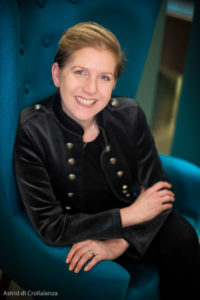After over a decade in law enforcement and with several bestsellers under her belt, Clare Mackintosh is a force to be reckoned with, on and off the page. For years, she lived the genre as a policewoman, then later took on the role of writer. With her debut, I Let You Go, she became an instant bestseller on both sides of the pond. Mackintosh has a way with creating breathless, brilliantly sculpted worlds that never deny the reader anything: she covers all the essentials—plot, character, atmosphere and setting, etc—and imbues them with her own unique voice. She works steadily throughout the week to meet her goals in writing, and has put out a book a year for three years.
Let Me Lie (Berkley, 2018) the latest from Mackintosh, is about a young woman whose parents commit suicide in identical ways, seven months apart. The protagonist is haunted by her mother and father’s deaths, but as secrets begin to unravel and an unexpected visitor arrives at her door, grief turns to fear and curiosity. Mackintosh’s protagonist must reckon with the past, the present, and most of all: the truth.
Matthew Turbeville: I just finished Let Me Lie, and not only was I overjoyed with my reading experience, I’m sure your many faithful and devoted fans will be too. What were the origins of this book? How did you think of such a complicated plot, as well as characters who are so brilliantly done?
Clare Mackintosh: I’m thrilled by such a positive response—thank you! I’d love to share the real-life case that inspired Let Me Lie, but—as you’ll know from reading an early copy—if I do that I will spoil at least one of the surprises. All I’ll say is that I wanted to explore the secrets we keep within families, and the way we feel when those secrets are exposed.
Turbeville: When beginning a novel, how heavy of a plotter are you? I’ve spoken with Alex Marwood, who definitely writes as she goes, and also with Laura Lippman, who does all sorts of plotting. Where do you stand when constructing your novels?
Mackintosh: I plan in great detail, then write the first draft and end up throwing out a lot of the plan! It’s almost as though the first draft is about finding the story, and then I re-plot to make sure the twists and turns are in the right place. It’s a long process…
Turbeville: One thing that struck me as very poignant was your description of one character’s BPD (Borderline Personality Disorder). A lot of authors use mental illness and other diseases as crutches, ways in which they can exploit a disease for their plot’s purpose. However, you go into depth about the disorder and constantly find a way to easily describe the sensations of what is perhaps the deadliest of mental illnesses. What research did you do when deciding to write about BPD? How did you manage to pull it off so artfully?
 Mackintosh: I feel very strongly that mental illness should never be used as a plot device, and I haven’t used it as such in Let Me Lie; you could remove it from the book and it wouldn’t affect what happens. That said, it does impact on the way Murray lives and works, just as physical health does. As a police officer I dealt with many people whose lives were touched by BPD and other disorders, and I drew on that experience in my writing.
Mackintosh: I feel very strongly that mental illness should never be used as a plot device, and I haven’t used it as such in Let Me Lie; you could remove it from the book and it wouldn’t affect what happens. That said, it does impact on the way Murray lives and works, just as physical health does. As a police officer I dealt with many people whose lives were touched by BPD and other disorders, and I drew on that experience in my writing.
Turbeville: One theme of Let Me Lie seems to be an issue of how well do we know the people around us, especially family. By the end of the novel, it turns out that Anna’s world has been flipped upside down and even some readers (i.e. myself) question suspiciously how well they know their own parents. Do you have any personal experience with this? It’s not a commonplace thing, or an everything day thing really, but we hear stories of people finding out horrible or enlightening truths about their own families. What would you say is the worst thing you could learn about a family member—and Anna learns a lot.
Mackintosh: I’m relieved to say I haven’t discovered anything terrible about my own family members. Yet.
Turbeville: How do you feel now that women are dominating the crime writing industry? Do you feel proud to be one of the most popular writers in the genre, and how do you use your influence to help other writers or writers on their way to hopefully somewhere near where you are today?
Mackintosh: Are women dominating the industry? They certainly aren’t dominating the review sections of the press, which continue to give more space to male authors. I feel incredibly lucky to have had such a positive publishing experience to date (long may it last!) and try to pay it forward by reading and championing other authors.
Turbeville: You have the ability to please and draw in fans of all types and backgrounds. How do you manage remaining a critical success while also writing so that anyone can enjoy your novels?
Mackintosh: I can honestly say I don’t think about who I’m writing for; I just write the story I want to tell. I love beautifully crafted sentences, but commercial fiction is about a cracking story, not just lovely prose, so I focus more on that.
Turbeville: What is your writing schedule like? Morning or night or afternoon writer? How many words a day or week? Do you write by hand or on the computer?
Mackintosh: Always computer, although I plot on paper and can’t do the reverse. I’ve stopped counting words, because it’s too depressing when I have a busy week and can’t write. I’m technically “behind” on my current work-in-progress, because the children were off school last week, and I couldn’t do any work. Generally I’m at my desk by 10 a.m., after a dog walk, and I work till around 6 p.m. I’m fortunate that my husband is at home to look after the kids when they come home from school, and to get supper ready. I rarely work at weekends, although there are exceptions, when a deadline is looming!
Turbeville: As a woman, and as a writer, how do you feel about applauding authors who refuse to write about violence against women? Do you feel it’s more helpful or hurtful to put work like this out there? Do you think that by not acknowledging the crimes in our literature it helps us ignore real life situations that are often all too dangerous or fatal?
Mackintosh: I don’t believe in censorship, and that extends to violence against women, which remains one of the biggest threats in society. We write about it because it’s still happening—why should we stop? It doesn’t need to be gratuitous, though, and I see too many crime novels in which this is the case.
Turbeville: You likely get asked this often, but how does your career in law enforcement inform your work? Do you believe it gives you an advantage when writing law enforcement characters that people who have not worked in the business may not be aware of?
Mackintosh: My police background helps me enormously. Obviously it’s useful to know the ins and outs of police procedure, but what’s much more useful is the insight it gave me into so many different areas of society. I spoke to people at times when their emotions were most raw—when they’d been victim of a crime, or witnessed a crime, or committed one—and that’s a very valuable experience for a writer of any genre.




















